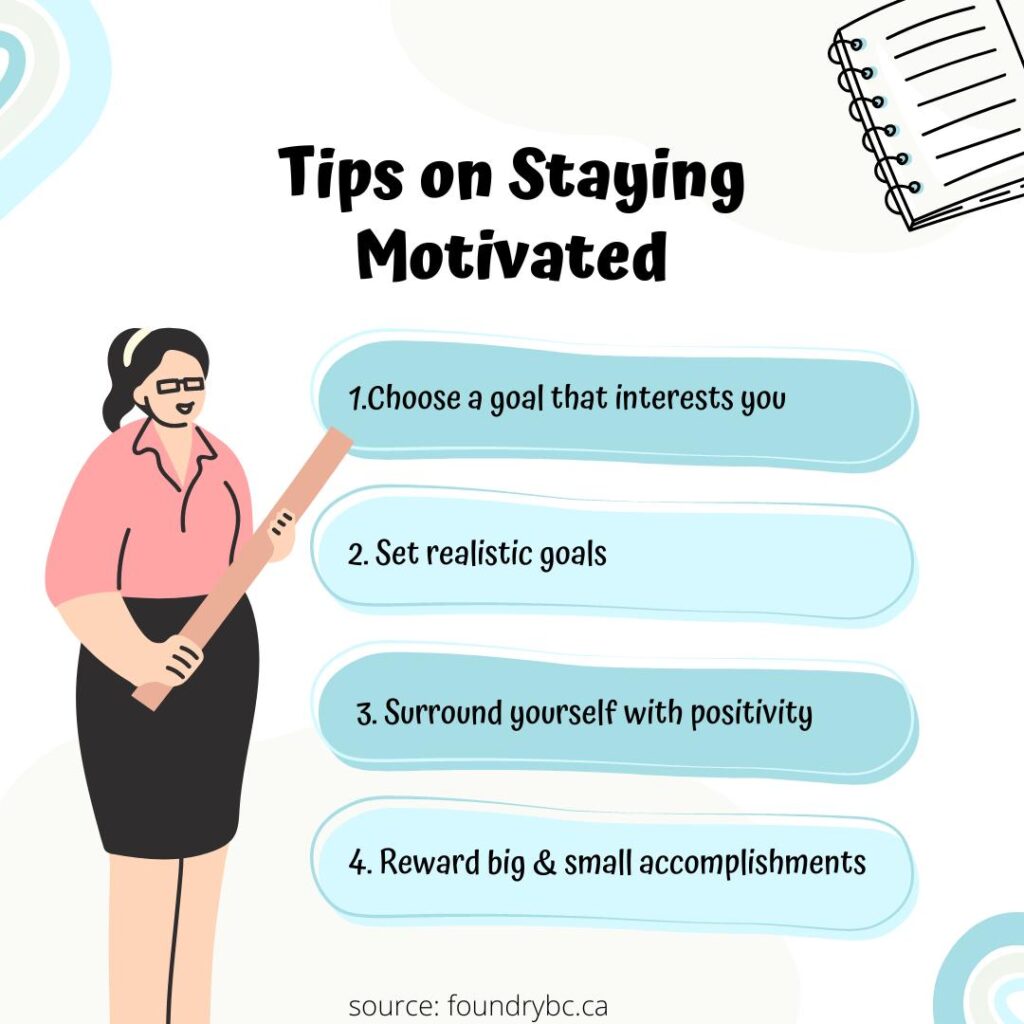The majority of people want to change at least one thing in their lives. However, it can be difficult to find the motivation to get started. This blog might help.

If you are wondering how to keep yourself motivated, this guide is for you.
Motivation is the desire to accomplish something, and it propels us to become successful. Having the motivation to achieve your goals and dreams, whatever they may be, is crucial. Motivating ourselves is important since it enables us to change our behavior, enhance our skills, develop creativity, create specific goals, broaden our interests, formulate plans, discover talents, and foster employee engagement. Motivation is a critical resource that enables us to adjust, operate effectively, and maintain our well-being under a never-ending stream of opportunities and threats.
What is Motivation?
The act of motivation is the process by which a person organizes, guides, and sustains a goal-oriented behavior. Motivation is a state of mind that desires change, whether it occurs inside of us or in the outside environment. Motivating ourselves is all about the internal drive to accomplish something important to us.
Motivating yourself – self-motivation is an important skill that encourages us to continue progressing towards a goal even when it feels challenging.
Types of Motivation
Some of the types of motivation are explained below:
Extrinsic Motivation: In this type of motivation, behavior is driven by external rewards such as money, frame, grade, and praise.
Extrinsic motivation examples include winning trophies in sports, working for money, and receiving customer loyalty discounts.
Intrinsic Motivation: In this type of motivation, there is engagement in a behavior because it is personally rewarding, not for an external reward.
A good example of intrinsic motivation is engaging in a sport for fun instead of aiming for prizes. Another example is studying a new language because you like to challenge yourself.
Why is Self-Motivation Important
Self-motivation helps you accomplish what you want to do. In order to be self-motivated, you must be passionate about your life and have a desire to succeed. Having the capability to motivate yourself is a critical skill that enables you to take advantage of new opportunities despite disappointments.
Reasons Why Self-Motivation is Important
Self-motivation doesn’t allow you to depend on others. The importance of self-motivation for a successful, happy, and fulfilling career and personal life can be explained by several factors. Find out why motivation is the key to career success. Check out a few here!
- Achieving Personal Goals
Having goals is the first step toward achieving your dreams. Therefore, you need the motivation to keep you pushing forward toward your goals. Motivating yourself brings determination to achieve personal goals. Motivated people have a strong desire to change their lives for the better. A person’s motivation propels them towards success by pushing them to change. Motivation allows you to define your goals, so you know exactly what you’re striving for.
- Increases Productivity
Motivated people perform better at their jobs, and motivation directly impacts their productivity. According to Psychology Today, motivation predicts success more than anything else, and success requires high performance. The more you understand what motivates you, the faster you will succeed in your career or reach your personal goals.
- Build your Confidence
When you’re motivated, your confidence builds up, and you start to think positively. Even when you face several issues, self-motivation keeps you going by never giving up and continuing to try to solve the issue.
- Makes you Happy and Satisfied
When you continue to motivate yourself, you can achieve your goals. It gives you happiness, and it gives you the pleasure of succeeding and reaching your goals. Whenever you feel depressed about the work you have to do, focus on your goals. Getting motivated and setting and achieving new goals can make you feel happier than you have ever felt before.
- Increase your Commitment
Self-motivation gives you the power to decide if you like your job. Your employees’ motivation and commitment motivate them to do their best work, while commitment energizes them to accomplish tasks.
- Put yourself in a Positive Environment
Although keeping a positive attitude is not always easy, you can still try your best. Adopting positive beliefs can help you cope with difficult circumstances.
Otherwise, you will lose hope and become discouraged. Develop positive habits and embrace positive thinking to avoid negative emotions.
What are the Elements of Self-Motivation?
The four elements that make motivation are:
- Personal Desire: The personal drive to achieve a strong desire to reach set goals is one of the elements of motivation. This passion allows for growth and improvement. An individual’s motivation for achieving something can be classified as passion growth, determination, empowerment, or motivation.
- Commitment to goals: Committing to the set goals is the second element of motivation. In order to stay motivated, one must set goals, make efforts regularly no matter what, not give up, and keep focused and committed to achieving their goals.
- Initiatives: The third element of motivation is the ability to effectively grab and take advantage of the opportunities whenever they occur. It is defined as the readiness to act on opportunities. Generally, you spend a lot of time overanalyzing, worrying, fearing, and hesitating which robs you from the opportunities that present themselves. Make sure you take advantage of any opportunities that come your way by taking the initiative to act on them.
- Optimism: Being optimistic is the ability to keep going and achieve goals despite the setbacks you face on your journey. It is about not dwelling on the negative feelings you face while suffering through a rough patch and looking for the next best thing to excel in no matter how many obstacles you have to face. Optimism is the fourth element of motivation that describes your ability to overcome obstacles, and pursue, and achieve your goals with a positive mindset.
Self-motivation tips
Look closer at each of the above tips, which include descriptions of the self-motivation techniques and the science behind them.
Put Your Goal on the Calendar
One way to boost your internal motivation is to create some external motivation: a target date. Whatever you’re aiming to accomplish, put it on the calendar. You may be working toward a goal with a set finish date built in. Examples include preparing for a test or taking a course with a fixed end date.
If your goal lacks this structure, you can add it by deciding on a date by which you could realistically achieve your goal.
Want to run a 5k or marathon? Sign up for a race on or near your target date. Considering a degree? Research the application deadline and write it down. Are you aiming to learn a new career skill and need work motivation? Register for a course and set a target date to finish.
Having a target date not only helps you stay motivated but also helps you track your progress—you always know how much further you have to go. This can have a big impact on your performance.
Make Working Toward Your Goal a Habit
When you make working toward your goal a habit—an automatic conditioned response—you no longer have to rely so much on feeling motivated. How do you turn a behavior into a habit?
- Identify a trigger.
Choose something you already do daily, like brushing your teeth or eating lunch, to trigger the action you want to make a habit. Write an ‘if-then’ plan (or an implementation intention).
For example, if you want to create a habit of studying for a class every day, your if-then plan might look like this:
If I pour my first cup of coffee, then I will spend five minutes on my math homework.
To build consistency in exercise, it might look like this:
If I get up and brush my teeth, then I will immediately put on my workout clothes.
Making this plan and committing it to writing could increase the likelihood of following through.
- Start small.
Notice that the above examples do not say you’ll read six textbook chapters, watch two hours of lecture videos, or spend an hour sweating on the treadmill.
Getting started is often the hardest part on low-motivation days, and starting is much easier when the task is small: Five minutes of study or putting on your workout clothes.
These seemingly small actions can prime your mind for the task at hand, so the follow-through, a longer study session or a full workout, can happen more naturally with less mental resistance, according to The Science of Self Help.
Plan for Imperfection
Feeling excited and confident about achieving your goal is great, but it’s also possible to be too optimistic. Not every day will go exactly as planned, and that’s okay. Life happens.
One way to boost motivation on difficult days is to plan for them. As you think about your goal, jot down a list of the things that could get in your way. If you’re taking an online course, this could include:
- Losing internet access
- Getting a phone call in the middle of a study session
- Having a child home-sick
- Feeling stuck on a difficult concept or assignment
- If your goal is to go running every day, some obstacles might include:
- Rainy weather
- Injury
- Illness
- Getting asked to stay late at work during the time you usually run
Once you have your list, plan how to handle the obstacle. How can you plan ahead for when your internet goes out? Maybe you could keep a few lecture videos downloaded to your phone or computer for offline access, or you could identify a nearby coffee shop that offers free Wi-Fi. Now, when that obstacle pops up, instead of losing motivation and feeling deflated, you have a plan in place to keep the momentum going. Remember that missing your task is a perfectly acceptable plan for some obstacles.
Don’t Stay in Your Comfort Zone
Among the most effective ways to stay motivated is to strive for new challenges and opportunities. You can achieve this by setting more challenging goals than you’re used to. Try to learn new skills to improve your performance at work or take on a challenging project at work. As you go beyond what you’re comfortable with and strive to achieve new successes, you can learn new things. You are likely to achieve more by gaining experience and reaching higher goals.
- Quick Ideas to Leave Your Comfort Zone: Below are some ideas for getting out of your comfort zone and doing something new for growth.
- Make changes to your daily routine
- Do everyday things differently
- Take workouts to the next level
- Challenge your beliefs
- Expand your professional skillset
- Put yourself in a new environment
- Consider other points of view
- Don’t pick the safe choice
Set Small Goals to Build Momentum
If you want to change the world, start off by making your bed. If you make your bed every morning, you will have accomplished the first task of the day. It will give you a small sense of pride, and it will encourage you to do another task, and another, and another. Naval Admiral William H. McRaven gave this advice during his commencement speech at the University of Texas at Austin in 2014. The former Navy SEAL was onto something.
Research shows that frequent small successes can build a sense of momentum that can, in turn, drive long-term success, especially early in the process. Whatever your big goal may be, start by breaking it down into smaller chunks. Getting a new job might be a big goal. Smaller goals could be updating your resume, making a portfolio website, earning a certification, or attending a networking event.
Track Your Progress
Seeing progress can be highly motivating. You’ll find many tools out there to help you track your goals. This could be as simple as a to-do list or calendar where you can cross off tasks or days as you complete them. You can draw a progress bar on a sheet of poster board or paper. Hang it somewhere where you’ll see it regularly, and fill it in as you get closer to your goal.
Reward Yourself for the Little Wins as well as the Big Ones.
It feels good to be rewarded for our work. However, rewards can also improve motivation and performance. Rewarding yourself for reaching small milestones and completing big goals could boost your interest and enjoyment in the work you’re doing.
These rewards don’t have to be big or cost a lot of money. Consider this quick list of ideas you could use to reward yourself:
- Take a short break
- Go for a walk outside
- Enjoy your favorite snack
- Read a chapter of your favorite book
- Spend a few minutes meditating
- Listen to an episode of your favorite podcast
- Plan a night out with friends
- Play an online game
- Visit a free museum or attraction
- Have a long bath or shower
- Call a friend or family member
Spend a few minutes making your own reward list so that you’re ready to celebrate your wins, big and small.
Practice Gratitude (including for yourself).
It might seem like gratitude would lead to complacency and acceptance of the status quo. Yet some studies have shown otherwise. Feelings of gratitude can:
- Motivate self-improvement
- Make us feel connected to others (i.e. part of the team)
- Enhance motivation across time, beyond the duration of the gratitude practice
- Induce a sense of wanting to give back
- Improve physical and mental health, as well as sleep
More than one way to foster an attitude of gratitude exists. Spend the first five minutes after you wake up going through everything you feel grateful for. Better yet, write them down in a gratitude journal. Is there someone in your life you’re particularly grateful for? Write them a letter expressing your thanks.
Embrace Positive Peer Pressure
You’re ultimately the one who puts in the work to achieve your goals. But other people can be a great motivator.
Research shows that feeling like you’re part of a team can boost perseverance, engagement, and performance, even if you’re working alone. Depending on your goal, this might mean joining a study group, running team, gym class, professional organization, or virtual challenge.
Another study suggests that sharing your goal with someone whose opinion you value can strengthen your commitment to attaining that goal. For work goals, consider sharing with a mentor or supervisor. You might share educational goals with a teacher or academic advisor or fitness goals with a coach or fellow gym member you admire.
Eliminate Your Distractions
Eliminate distractions from work so that you can be more productive and, consequently, have more leisure time. When distraction becomes a habit, you can lose the concentration required for work. You can minimize distractions and accomplish your most important tasks by planning and managing your time effectively.
Install a productivity extension in your browser if browsing the web aimlessly. With these extensions, you can block certain sites and restrict browsing times.
- Quick Ideas for Eliminating Distractions: Consider using these strategies to minimize distractions at work and improve your daily work output while staying motivated.
- Complete the most challenging task early in the day
- Set time limits on your goals
- Be aware of when you lose focus
- Monitor your mind wandering
- Take on more challenging work
- Break the cycle of stress and distractions
- Keep your place organized
Do Some Mood-lifting
A good mood has been linked to increased productivity and improved quality and quantity of work. This doesn’t mean you have to be positive all the time—that’s unrealistic. But if you’re feeling sluggish about working toward your goal, a quick mood lift could be enough to get you started.
Need some ideas for how to boost your mood? You could try to:
- Spend some time in nature (or at least get some sunlight)
- Look at some cute pictures or videos of animals on video sharing platform
- Watch funny videos on YouTube
- Exercise
- Adopt an alter ego (i.e. the Batman effect)
Change Your Environment
Sometimes, a change of scenery can help you approach your task with fresh eyes (and a new sense of motivation). This is called the novelty effect, a short-term boost that comes from altering your environment.
If you usually study at home, have a session at your local library. Do you always watch lecture videos on your computer? Try downloading them to your phone to watch outside in the park. Switch up your running route, or try a new exercise routine.
Remember Your ‘Why’
Why is this goal important to you? Why is that reason important to you? Why is motivating yourself important to you? Why do you need to do that? Keep digging until you get your ultimate ‘why’; the core value that’s driving your goal. To further reinforce your ‘why’, set an alarm every morning to remind yourself to spend one or two minutes visualizing what success would look like. What would it feel like to actually achieve your goals?
Motivating yourself is important for overcoming daily challenges, taking advantage of opportunities, and utilizing time efficiently to move forward and accomplish goals. Try the above tips and tricks to stay motivated if you have been unsuccessful in getting motivated.


















